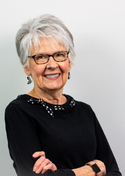
 Lyn Turknett,
Co-founder and Co-chair, TLG
Lyn Turknett,
Co-founder and Co-chair, TLG
Heidi Roizen was a Silicon Valley venture capitalist – one of the first women in a field still dominated by men. In 2000 she was the subject of a business school case. She was confident, competent, and successful.
Confidence does not come so easily to many women. Katy Kay and Claire Shipman wrote a book and an article for The Atlantic on women’s pervasive issues with confidence – issues that impact their willingness to negotiate for a higher salary and likely their ability to be seen as leaders. We have found gender-based confidence gaps in our research at TLG. We first analysed our 360 data by gender in 1997. We found, as have others, that women were rated higher by coworkers on many more dimensions than men, but there was one glaring difference: women were seen as less confident. We have also found that women rate themselves significantly lower on self confidence (a part of our Leadership Character Profile assessment) and generalized self-efficacy, which measures an individual’s perception of their ability to perform difficult tasks and to cope with challenge.
So back to Heidi Roizen. Frank Flynn, a professor at Stanford, decided to do an experiment with the Heidi Roizen case. Here’s a bit of what he found, in his own words:
To support this discussion, I presented to students the results from a study I did a couple years ago involving the Heidi Roizen case. Specifically, with Harvard’s permission, I changed the original materials so that one section of the class received a version of the case called “Howard” Roizen (same case, just different pronouns) and the other section received the original case. Before class, I had the students go online and rate their impressions of “Roizen” on several dimensions. As you might expect, the results show that students were much harsher on Heidi than on Howard across the board. Although they think she’s just as competent and effective as Howard, they don’t like her, they wouldn’t hire her, and they wouldn’t want to work with her. As gender researchers would predict, this seems to be driven by how much they disliked Heidi’s aggressive personality. The more assertive they thought Heidi was, the more harshly they judged her (but the same was not true for those who rated Howard). See more here.
Women leaders walk a tightrope. If you lack confidence, you likely won’t succeed. If you display as much confidence as many men, you likely won’t succeed. I personally think awareness in the workplace is helping, but there are still wide gaps in expectations for acceptable behavior for women. Recent research shows that male scientists are much more flowery in praise for their own work, reporting in published papers that the findings are “unprecedented, remarkable.” Women are more factual and blander in self-description, and those differences may finally impact pay and promotion.
The fine line between doormat and “witch” is tough to walk, and I think the difficulty of that tightrope act is a major reason that there isn’t close to gender parity at senior levels. There are, however, women who manage it well, and those women are invaluable role models for the rest of us.
I met Susan Hitchcock, the founder and still the “mother” of the Turknett Women in Leadership Signature Series, in 1992. She joined our firm in 1992, and I saw first-hand a woman who, in Leadership Character Model parlance, balanced humility and confidence almost perfectly. She had been a role model for women at BellSouth for 24 years, and she brought that combination of get-it-done toughness and all-encompassing empathy and respect to TLG.
In 2003 she started the Turknett Women in Leadership series. In thinking about what that has meant, I realize that she has given thousands of women access to hundreds of female tightrope walkers – role models for balancing humility and confidence in a way that works.
I believe that we learn through watching. And that’s how we best learn leadership. I am proud to have had a small part in the legacy of Women in Leadership, and I am inordinately grateful for Susan Hitchcock.

